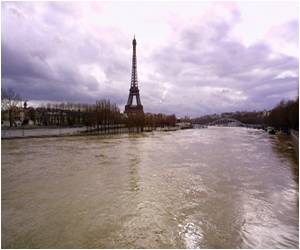The OECD said that the Paris region would be highly vulnerable to exceptional flooding of the River Seine, warning that a once-a-century event would cripple France's commercial, political and cultural hub.

A repeat of the city's costliest flood, in 1910, would affect up to five million people and threaten 400,000 jobs, said the Organisation for Economic Cooperation and Development (OECD) grouping of advanced economies.
A quarter of the region's electricity network would go down, 140 of the 250 kilometres (87 of the 150 miles) of Paris' subway (Metro) system would be closed, and bridges over the river at the heart of the city would be closed to vehicles.
About five million people would suffer "extended" cuts in their water supply. Another 1.3 million would have access to water, but of inferior quality.
The immediate economic costs would range from three billion to 30 billion euros ($4 billion to $40 billion) depending on the flood's duration. Over the following five years, gross domestic product (GDP) would be cut by between 0.1 and three percent -- equal to 1.5 billion to 58.5 billion euros.
The flooding could last in some places for weeks, given that the Seine tends to rise but also recede very slowly, the OECD said.
Advertisement
But this investment trailed off in the early 1990s, it said. Since then, the building of factories, offices, homes and roads in flood-prone zones along the river has revived the risk.
Advertisement
It called for a greater effort to beef up flood resilience in essential services.
The report cautioned that "once-a-century" flooding may be a low benchmark. It noted this standard had already been breached by floods in recent years in Queensland, Bangkok, Pakistan and Germany and in New York by Tropical Storm Sandy.
A European Union flood directive, factoring in the likely impact of climate change, uses once-in-a-millennium events as the benchmark for flood preparedness, it added.
Source-AFP









